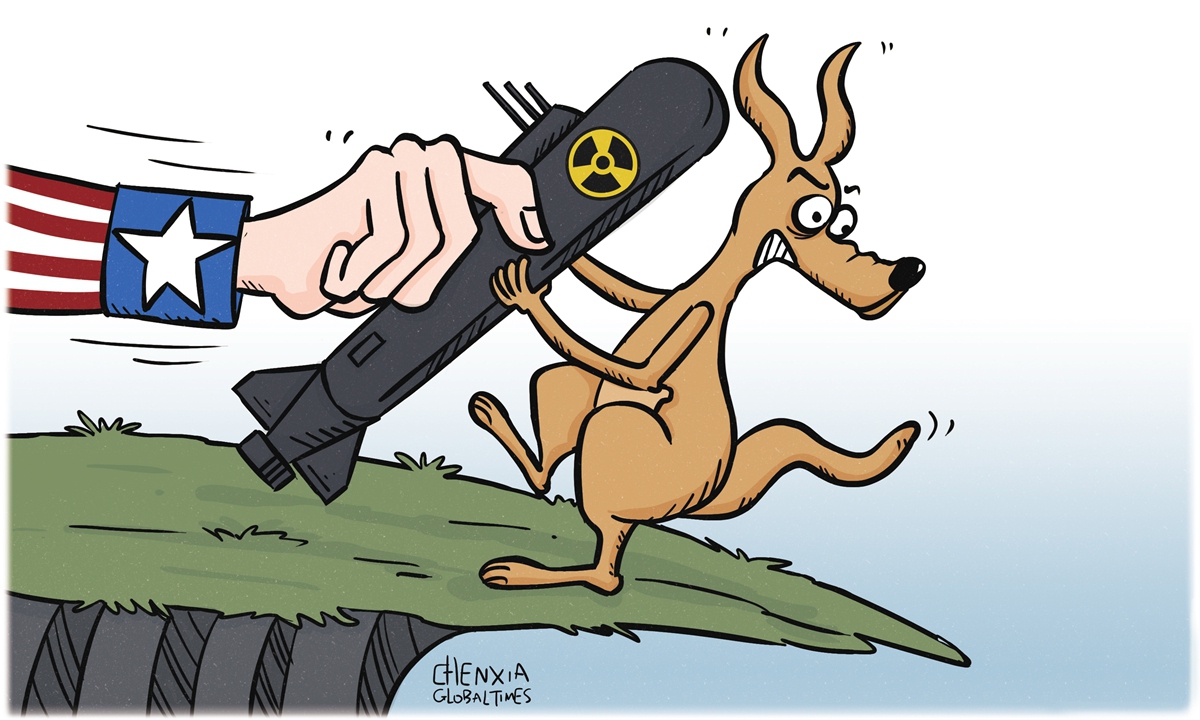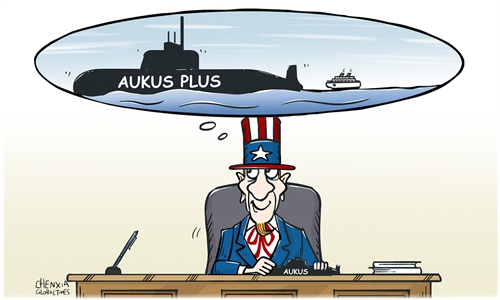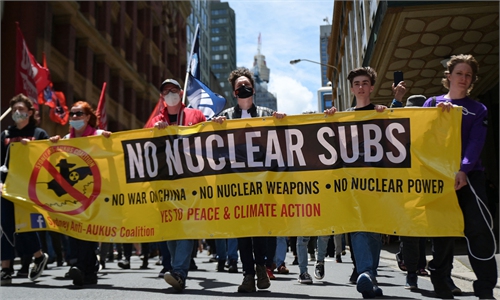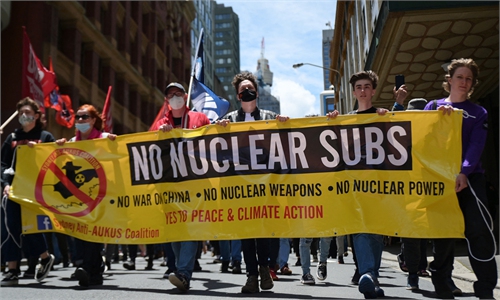In economic recovery era, US is biggest threat by trapping Australia's development interests

Illustration: Chen Xia/GT
Both China and the US are busy in March. China was busy brokering an unexpected reconciliation between Saudi Arabia and Iran. From March 10, when the two countries agreed to bury the hatchet and resume ties in Beijing, the Middle East has shed a pair of enemies and gained two partners. In contrast, the US is busy paving the way for more tensions and conflicts, through moves including promoting AUKUS.The leaders of the US, Australia and the UK are set to meet in San Diego on Monday local time to unveil plans to develop nuclear-powered submarines for Australia under AUKUS partnership. "According to leaked details, from the next decade, Australia will purchase between three and five current US Virginia-class nuclear-powered submarines before it starts [building] submarines in Adelaide," Australian media Nine News reported on Monday. From 2027, the US will also begin deploying nuclear submarines in Perth as a stop-gap measure, the report added.
When China sits down with friends, it is for peace. When the US and its partners get together, the agenda is about confrontation. Since the announcement of AUKUS 18 months ago, many observers, including those from Australia, have said the alliance, under the guise of nuclear-powered submarines cooperation, is essentially about US arming Australia and turning it into a US military asset against China, laying a timed bomb for peace and stability in the region.
It has been plain to all that AUKUS takes China as its imaginary enemy. "Continuing promoting the alliance means that Australia will officially put itself on Beijing's defense radar," Chen Hong, president of the Chinese Association of Australian Studies and director of the Australian Studies Centre at East China Normal University, told the Global Times.
The question is, is it worth it? Purchasing is just the first step. According to previous reports, at least eight nuclear-powered submarines will be built at Australia's Osborne Naval Shipyard in Adelaide, the capital of South Australia. It means the current price tag on AUKUS pact that Australian government has to pay is only a temporary figure.
In the future, the manufacture, repair and maintenance of ships and relevant equipment, as well as more interaction with the US, will all bring higher expenses to Australia. In the end, AUKUS will become a bottomless pit, forcing Australia to take money out of its own pockets to pay for the US' strategy, Chen said. Not to mention before Australia obtains the nuclear submarines, it has to pay a $835 million compensation to a French submarine contractor for ditching cooperation with the latter.
For Australia, at this moment, domestic economic development should be placed as the top priority. The Scott Morrison administration's tough stance on foreign affairs has not brought benefit to the Australian people, leading to the Labor Party, which advocates economic reform, to gain power. Economic issues are the core concerns of every government. If cooperation with the US cannot improve the Australian economy during the Labor Party's term in office, vigilance is needed to check whether such cooperation has become a burden on the Australian people, Yang Honglian, a senior researcher at the Pacific Islands Research Center of Liaocheng University based in Fiji, told the Global Times.
As former Australian diplomats agreed at Global Times' Global Minds Roundtable on China-Australia Relations, held on March 6, China is not knocking at Australia's door to invade Australia; China provides economic opportunity and prosperity, while the US is offering death and destruction.
The current Australian administration seems to be hoping for a thaw in ties with China. This is because Australian economy is not doing well with rising unemployment rate, soaring house prices, stagnated wages, and the sting of inflation. At this point, what the Australian government needs the most is stabilizing prices, creating jobs, and expanding exports. In other words, it needs to restore trade ties with its largest export market, the Chinese market, because the latter is simply irreplaceable for Australia, Yu Lei, a chief research fellow at the Research Center for Pacific Island Countries of Liaocheng University, told the Global Times.
The reality is picked up by The Washington Post, which published an article entitled, "China and Australia are starting to get along. Will AUKUS torpedo it?" It acknowledges that "AUKUS is coming over the horizon, and whatever comes is going to be unwelcome in Beijing," but then slyly suggests that whatever the case, "the timeline was set out when AUKUS was announced 18 months ago," therefore, "it's China's choice as to whether this announcement is disruptive." This makes no sense. Whether it is disruptive depends on whether the new announcement endangers China's national security, sovereignty and territorial integrity. If yes, China will without doubt adopt corresponding response.
"For Australia, AUKUS has become a gamble," said Chen. Australia has and will continue its huge investment in the nuclear-powered submarine project, but what can it get in return? Will it be as dreamlike as it is portrayed? The question is left unanswered. However, what Australia will lose is simply crystal clear.
In an era when countries worldwide are striving for economic recovery, the US has become Australia's biggest threat, Chen added.



